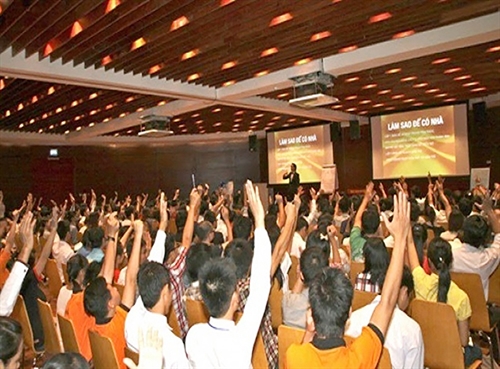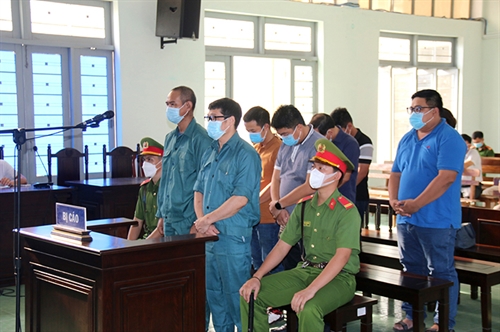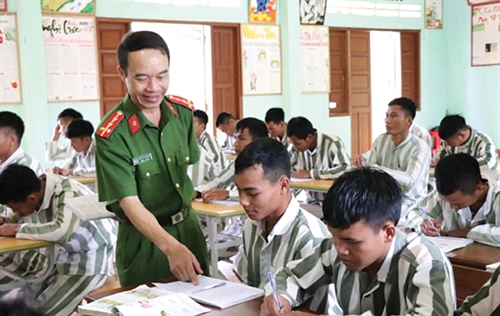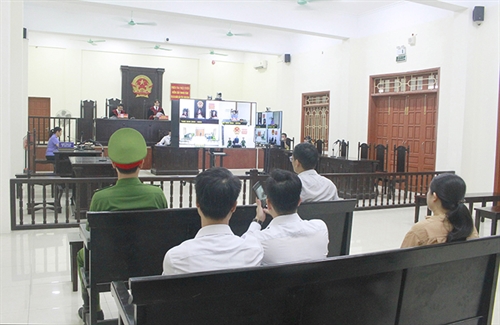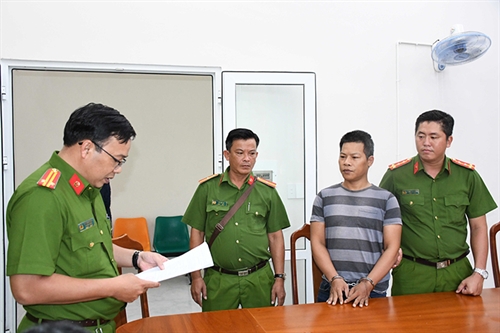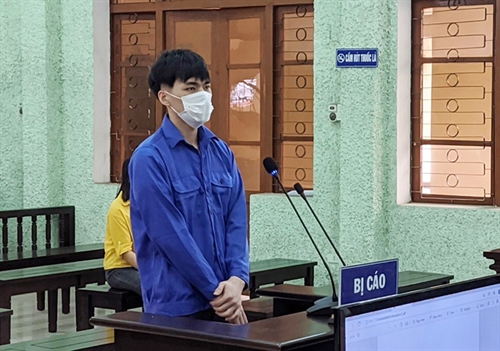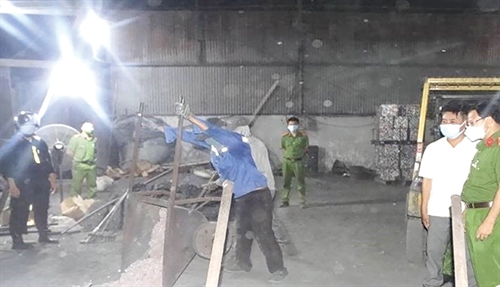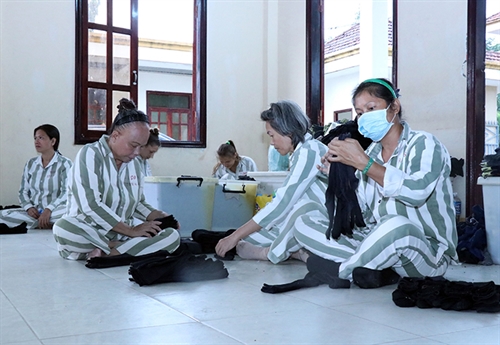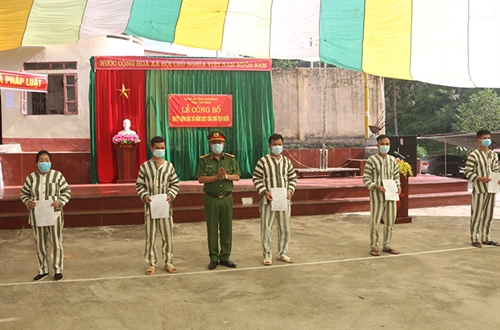As a supervision and education measure for under-18 offenders, community-based conciliation is provided for the first time in the 2015 Penal Code and the 2015 Criminal Procedure Code, marking a turning point in Vietnam’s policies on criminal handling of juvenile delinquents in compatibility with current global trends in juvenile justice. This measure is different from the other two judicial measures[1] applicable to under-18 offenders as it involves more active participation of victims and their representatives in criminal proceedings, and facilitates the use of opinions of victims during the conciliation process for handling juvenile offenders.
Le Thi Thuy Duong
Criminal Law Department, Ho Chi Minh City University of Law[2]
Legal grounds of the community-based conciliation measure
Vietnam’s current penal law and criminal procedure law officially provide this measure in Articles 92 and 94 of the 2015 Penal Code (revised in 2017) (the PC)[3] and Articles 426 and 428 of the 2015 Criminal Procedure Code (the CPC)[4]. In addition, the procedures for application of this measure are guided in detail in Government Decree 37/2018/ND-CP (Decree 37) and Article 16 of Joint Circular 06/2018/TTLT-VKSNDTC-TANDTC-BCA-BTP-BLDTBXH (Joint Circular 06). These provisions offer under-18 offenders with an opportunity to review their criminal acts and bear liability for such acts without criminal records. This has also manifested the translation of relevant provisions of treaties to which Vietnam is a State Party, including the Convention on the Rights of the Child[5], into the domestic criminal law.
Conditions for application of the community-based conciliation measure
Under Articles 91, 92 and 94 of the PC, community-based conciliation may be applied to offenders who:
- Are aged between full 16 years and under 18 years and commit less serious crimes or serious crimes; or
-Are aged between full 14 years and under 16 years and intentionally commit very serious crimes defined in Article 12.2 of the PC, except the crimes specified in Article 123, Article 134 (Clauses 4, 5 and 6), and Articles 141, 142, 144, 150, 151, 168, 171, 248, 249, 250, 251 and 252 of the PC.
Investigation bodies, procuracies and courts may decide on application of this measure when under-18 offenders or their lawful representatives consent to such application[6]. Besides, both the PC and the CPC recognize the willingness of victims or their lawful representatives to participate in conciliation as a condition for organization of conciliation[7].
 |
| A workshop on protection against violence and discrimination based on sexual orientation and gender identity__Photo: https://vov2.vov.vn |
Persons entitled to decide on application of the community-based conciliation measure
Heads or deputy heads of investigation bodies, chief procurators or deputy chief procurators of procuracies, or trial panels may decide to apply the community-based conciliation measure depending on each proceeding stage, provided under-18 offenders or their lawful representatives consent to such application[8]. Specifically, investigation bodies may decide on application of this measure in the stage of investigation of initiated criminal cases, while procuracies or courts may decide to apply this measure in the stage of prosecution or trial, respectively.
If the conciliation is successfully concluded with agreements on exoneration from penal liability for offenders, the proceedings will end with procedural decisions corresponding to the proceeding stage in which the conciliation is carried out. Specifically, investigation bodies or procuracies may issue decisions on cessation of investigation or decisions on cessation of criminal cases[9], respectively, while trial panels may rule on exoneration from penal liability for offenders.
It might be questioned that why this measure is not available in the stage of initiation of criminal cases and why judges presiding over court hearings are not empowered to decide to apply this measure in the stage of trial preparation. The answer is that such can lead to prolonged settlement of criminal cases and runs counter to the principle of quick and timely settlement of cases involving under-18 persons[10].
Procedures for community-based conciliation
Under Article 428 of the CPC, depending on the proceeding stage, conciliation participants may include the investigator or procurator or judge assigned to settle the criminal case, a representative of the People’s Committee responsible for coordination in the settlement of the case, the under-18 offender and his parent(s) or lawful representative, and the victim and his lawful representative (if any). The investigator, procurator or judge, but not the conciliator or anyone else, will preside over the conciliation.
As mentioned above, the procedures for organizing a community-based conciliation are provided in Article 428 of the CPC and guided in detail in Decree 37. To make it clearer, Article 16 of Joint Circular 06 says that the community-based conciliation consists of three steps as follows:
Step 1: Before the conciliation is organized
A competent authority issues a decision on application of the community-based conciliation measure. At least three days before the conciliation is carried out, the decision will be delivered to the under-18 offender and his parent(s) or lawful representative, the victim and his representative, and the commune-level People’s Committee of the locality where the conciliation is carried out. The commune-level People’s Committee of the locality where the offender resides will coordinate with related entities in arranging time and place for the conciliation, inviting conciliation participants, and carrying out other preparations.
Step 2: Organization of the conciliation
The investigator, procurator or judge assigned to hold the conciliation will coordinate with the commune-level People’s Committee of the locality where the conciliation is carried out in organizing the conciliation session and making conciliation minutes. The conciliation will review the criminal act of the offender and discuss commitments and obligations he will have to perform if the conciliation is successful.
Step 3: Conclusion of the conciliation
The investigator, procurator or judge holding the conciliation will read the conciliation minutes aloud to the conciliation participants. If any participant requires the minutes to be modified or supplemented, the investigator, procurator or judge will record modifications or supplementations in the minutes and sign for certification. In case of refusal to do so, he will have to clearly state the reason in the minutes before delivering it to the conciliation participants.
Legal consequences of conciliation agreements
If the victim, who has willingly participated in the conciliation, requests exoneration from penal liability for the under-18 offender, such will be clearly stated in the conciliation minutes[11]. This means that the successful conciliation, conciliation results and the victim’s request for exoneration from penal liability for the charged offender will serve as a basis for the competent body to decide to give exoneration from penal liability for the accused or defendant. On the contrary, if the conciliation fails, the settlement of the criminal case will continue. Therefore, the community-based conciliation measure and obligations that under-18 offenders commit to perform may be regarded as conditions for the competent body to decide to grant them exoneration from penal liability.
After being exonerated from penal liability thanks to the successful conciliation, the under-18 offender will, in addition to making an apology to the victim and compensating for the damage, have to abide by law, internal rules and regulations of his place of residence, study or work, show up before a competent agency when so requested, and attend study and job training programs organized by the local authority and perform labor jobs in appropriate forms[12]. He will submit to supervision and education under a specific plan issued by the chairperson of the commune-level People’s Committee of the locality where he will reside. The period for performing these obligations is between three months and one year[13]. After completely undergoing the supervision and education, he may be granted a certificate of complete execution of the community-based conciliation measure[14].
Assistance for charged offenders in obligation performance
Vietnam’s criminal law does not specify persons responsible for assisting under-18 offenders subject to the community-based conciliation measure in performing law-specified obligations and obligations stated in successful conciliation minutes. However, it specifies persons responsible for supervising and educating such offenders after they are exonerated from penal liability. These persons include public security officers, civil servants engaged in culture-social affairs and judicial-civil status registration, commune-level officers in charge of child protection and social affairs, and representatives of the Women’s Union and Communist Youth Union, and prestigious persons who have good ethical qualities, capacity and experience in the juvenile delinquent education and assistance and are assigned by commune-level People’s Committee chairpersons[15]. They will coordinate with related agencies and organizations in providing legal aid and creating conditions for the offenders to participate in general education and vocational education programs and perform appropriate labor jobs.
Recommendations
To improve the provisions of the penal law and criminal procedure law regarding the community-based conciliation measure and facilitate its application in practice, the author proposes some recommendations.
Firstly, lawmakers should regard community-based conciliation as a measure to be taken when the conditions for considering exoneration from penal liability for under-18 offenders are fully satisfied and conciliation results as a necessary condition for competent bodies to decide to give exoneration from penal liability for such offenders. If the conciliation is successfully concluded with agreements reached between the conciliation participants, competent bodies will decide to give exoneration from penal liability. Otherwise, the normal criminal proceedings will be conducted or resumed against such offenders. Likewise, if under-18 offenders subject to this measure fail to strictly perform such agreements or obligations without a plausible reason, they will be put again under criminal proceedings as the settlement of their criminal cases is resumed.
Secondly, it is recommended to apply the conciliation measure right from the initial proceeding stage or even prior to the issuance of decisions on initiation of criminal cases whenever all conditions for application of this measure are in place. Moreover, it is a need to add legal grounds for cessation of criminal cases within the time limit for hearing preparation when the participants have reached a consensus about the community-based conciliation. At the same time, it is advised to clearly define the competence of judges presiding over court hearings to apply the community-based conciliation measure and cease criminal cases within the time limit for hearing preparation. These supplementations will help free juvenile offenders from criminal proceedings as soon as possible and help them conveniently and quickly integrate themselves into the community.
Thirdly, in order to best guarantee the rights and interests of both offenders and victims, the author recommends considering also the will of victims or their lawful representatives before issuing decisions on application of the community-based conciliation measure and considering it, together with the consent of under-18 offenders or their lawful representatives, a prime condition for proceeding-conducting bodies to decide on application of this measure. In addition, it is suggested to annul the provision stating that victims or their lawful representatives request exoneration from penal liability (for offenders) as a condition for holding the conciliation[16]. The determination of whether or not the exoneration from penal liability is requested should be decided after the conciliation is held.
Fourthly, the author recommends providing the right of victims to participate or not to participate in the conciliation. If refusing to participate in the conciliation, the victims must clearly notify in writing their refusal to the conciliation-holding bodies and request for exoneration from penal liability for offenders.
In addition to conciliation participants specified by the current penal law and criminal procedure law, it is proposed to allow defense counsels and defenders of lawful rights and interests of victims to participate in the conciliation, provided victims or offenders so wish, as well as representatives of schools or organizations where offenders are studying or working.
Fifthly, it is necessary to professionalize conciliation activities through employing available grassroots conciliators (under the 2013 Law on Grassroots Conciliation) and permitting them to conduct conciliations as a neutral party after they are trained in penal law, criminal procedure law and criminological knowledge.
Sixthly, in order to ensure significance of successful conciliation results, Article 92 of the PC and Article 426 of the CPC should be revised toward treating the community-based conciliation measure as a condition for giving exoneration from penal liability to under-18 offenders and, at the same time, separating conditions for application of this measure from those for application of the measures of reprimand and commune-based education.
Seventhly, the Ministry of Public Security and Ministry of Justice should provide specific guidance on supervision and education programs suitable to different subjects in order to raise the effectiveness of the community-based conciliation measure. It is also recommended to establish specialized units to take charge of assisting under-18 offenders to perform their committed obligations.
Finally, there should be specific provisions on how to handle under-18 offenders subject to the community-based conciliation measure who breach their obligations stated in successful conciliation minutes or specified by law or how to handle such offenders for their failure to show up to competent agencies upon request.-
[1] The other two judicial measures are reprimand and commune-based education.[2] Email: lttduong@hcmulaw.edu.vn.[3] These articles provide conditions for application of the community-based conciliation measure.[4] These articles provide procedures for application of the community-based conciliation measure.[5] Article 40.3.b of the Convention on the Rights of the Child provides: “Whenever appropriate and desirable, measures for dealing with such children without resorting to judicial proceedings, providing that human rights and legal safeguards are fully respected.”[6] Article 92 of the PC.[7] Article 94.2 of the PC, and Article 428.5.g of the CPC.[8] Article 92 of the PC and Article 428 of the CPC.[9] Articles 230 and 248 of the Criminal Procedure Code.[10] Article 414.7 of the Criminal Procedure Code.[11] Article 428.5.g of the CPC.[12] Articles 93 and 94 of the PC.[13] Article 94.4 of the PC.[14] Article 20 of Decree 37.[15] Article 6 of Decree 37.[16] Article 94.2 of the PC.
